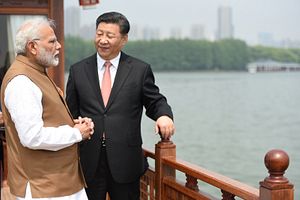The next plenary of the Nuclear Suppliers Group (NSG) is taking place this week, and a second plenary for the year later in December. India is making some serious but quiet efforts to garner support for its membership into the group, an exclusive club of 48 nuclear supplier countries.
The NSG strives to uphold and strengthen the nonproliferation architecture by implementing its own guidelines to regulate nuclear commerce. India has now become a member of three of the four export control mechanisms that deal with weapons of mass destruction (WMD) and other strategic technologies – the Missile Technology Control Regime (MTCR) in June 2016, the Wassenaar Arrangement in December 2017, and the Australia Group in January 2018.
Upon admission into the Australia Group, the group announced, “With its admission into the AG, India has demonstrated the will to implement rigorous controls of high standards in international trade, and its capacity to adapt its national regulatory system to meet the necessities of its expanding economy.” With accession to the three export control regimes, India has attempted to prove its nonproliferation credentials, particularly important because India is not a signatory to the Nuclear Non-Proliferation Treaty (NPT).
Becoming an NSG member would be a major foreign policy achievement for the Modi government but given China’s opposition, it is unlikely that this week’s plenary will see any forward movement. Nevertheless, given India’s technological advancements and its potential to engage in nuclear commerce in the future, it should be an imperative for the participating governments to bring India into the NSG tent rather than leave it outside.
India’s membership bid was first taken up for discussion at the Seoul plenary in June 2016 but Beijing at first even refused to entertain India’s case for discussion, using as an excuse India’s refusal to join the NPT. Though they were some other countries that were also unenthusiastic about India’s membership, it was China’s opposition that scuttled India’s entry into the NSG. The question is whether the recent bonhomie between India and China following the informal summit in Wuhan changed ground realities in India’s favor.
Indian security analysts believe that things are looking up for India. Many believe that there is a considerable shift in India-China relations after Modi’s meeting with Xi in Wuhan on April 27 and 28. While there is a general mood of optimism in the air and the optics of the relationship have improved, it is too early to suggest concrete positive changes in the bilateral relations between the two. Since the NSG makes decisions on the basis of consensus, there is little chance of India being able to join the NSG unless China drops its opposition.
Currently, India is believed to have undertaken some quiet diplomacy in reaching out to strategic partners and friends to push India’s membership at the upcoming NSG plenary. India has been in touch with countries such as the United States, Russia, and the Netherlands to make a concerted push at this week’s plenary.
The Netherlands Prime Minister Mark Rutte, during his recent visit to India reaffirmed the Dutch support to India’s NSG aspirations. The joint statement issued at the end of the visit noted, “In order to further strengthen global non-proliferation, the Netherlands reaffirmed its strong support to building consensus among regimes’ members on the issue of India’s membership to the Nuclear Suppliers Group; recognizing that India’s accession will add value to the aims and objectives of these regimes.”
It is not clear as to what extent these countries have been successful in effecting a change of mind in Beijing. India has also been articulating the need to have a merit-based approach while considering new applicants. India’s clean nonproliferation track record along with the NSG waiver in 2008 should strengthen the case for India. But there is also some understandable fear that member-states will get stuck at first establishing criteria to consider new membership cases.
Meanwhile, India is also trying to work with other countries such as Brazil, Argentina and South Africa, to head-off any procedural issue – which usually is an excuse — with examining the Indian application. South Africa has more than on one occasion extended support to India’s NSG membership bid.
India’s heightened diplomatic outreach to many of the NSG member countries is testament to the importance of this to the Modi Government. In May this year, the two ministers from the Ministry of External Affairs, MJ Akbar and VK Singh, were in Austria and Argentina respectively pushing the NSG agenda. India also hosted the foreign minister of Serbia in May.
But clearly, the big puzzle is China. If China were to behave as a more magnanimous power, it could change not only Sino-Indian relations for the better, but potentially wider Asian power dynamics as well. But this is far from certain.

































